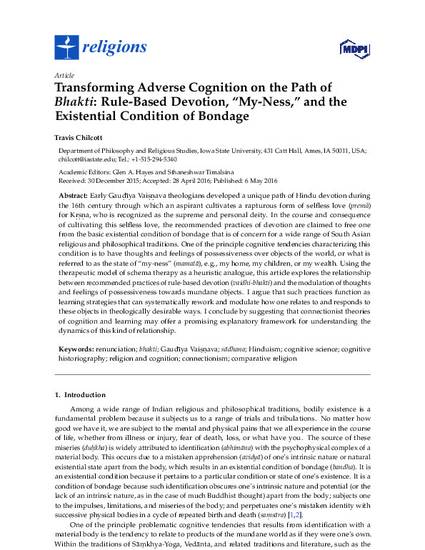
Article
Transforming Adverse Cognition on the Path of Bhakti: Rule-Based Devotion, “My-Ness,” and the Existential Condition of Bondage
Religions
Document Type
Article
Disciplines
Publication Version
Published Version
Publication Date
5-6-2016
DOI
10.3390/rel7050049
Abstract
Early Gauḍīya Vaiṣṇava theologians developed a unique path of Hindu devotion during the 16th century through which an aspirant cultivates a rapturous form of selfless love (premā) for Kṛṣṇa, who is recognized as the supreme and personal deity. In the course and consequence of cultivating this selfless love, the recommended practices of devotion are claimed to free one from the basic existential condition of bondage that is of concern for a wide range of South Asian religious and philosophical traditions. One of the principle cognitive tendencies characterizing this condition is to have thoughts and feelings of possessiveness over objects of the world, or what is referred to as the state of “my-ness” (mamatā), e.g., my home, my children, or my wealth. Using the therapeutic model of schema therapy as a heuristic analogue, this article explores the relationship between recommended practices of rule-based devotion (vaidhi-bhakti) and the modulation of thoughts and feelings of possessiveness towards mundane objects. I argue that such practices function as learning strategies that can systematically rework and modulate how one relates to and responds to these objects in theologically desirable ways. I conclude by suggesting that connectionist theories of cognition and learning may offer a promising explanatory framework for understanding the dynamics of this kind of relationship.
Rights
This article is an open access article distributed under the terms and conditions of the Creative Commons Attribution
(CC-BY) license (http://creativecommons.org/licenses/by/4.0/).
Copyright Owner
The author
Copyright Date
2016
Language
en
File Format
application/pdf
Citation Information
Travis Chilcott. "Transforming Adverse Cognition on the Path of Bhakti: Rule-Based Devotion, “My-Ness,” and the Existential Condition of Bondage" Religions Vol. 7 Iss. 5 (2016) p. 49 Available at: http://works.bepress.com/travis-chilcott/4/

This article is Religions 2016, 7(5), 49; doi:10.3390/rel7050049. Posted with permission.
Early Gauḍīya Vaiṣṇava theologians developed a unique path of Hindu devotion during the 16th century through which an aspirant cultivates a rapturous form of selfless love (premā) for Kṛṣṇa, who is recognized as the supreme and personal deity. In the course and consequence of cultivating this selfless love, the recommended practices of devotion are claimed to free one from the basic existential condition of bondage that is of concern for a wide range of South Asian religious and philosophical traditions. One of the principle cognitive tendencies characterizing this condition is to have thoughts and feelings of possessiveness over objects of the world, or what is referred to as the state of “my-ness” (mamatā), e.g., my home, my children, or my wealth. Using the therapeutic model of schema therapy as a heuristic analogue, this article explores the relationship between recommended practices of rule-based devotion (vaidhi-bhakti) and the modulation of thoughts and feelings of possessiveness towards mundane objects. I argue that such practices function as learning strategies that can systematically rework and modulate how one relates to and responds to these objects in theologically desirable ways. I conclude by suggesting that connectionist theories of cognition and learning may offer a promising explanatory framework for understanding the dynamics of this kind of relationship.